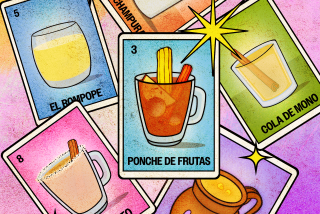Cuppa Cuba
- Share via
Most Caribbean islands raise coffee, and Cuba is no exception. But Cuban coffee hasn’t been available in this country since the early ‘60s because of the trade embargo, so those who love its distinctive flavor have had to go without.
Now, though, a company named Cubita claims to have found a microclimate in Ecuador that provides almost exactly the same coffee-growing conditions as central Cuba.
There’s a Latin American saying to the effect that coffee should be hot, black and sweet, only we can never remember whether it goes “as black as night, as hot as hell and as sweet as love” or “as hot as love, as black as hell and as sweet as night” or what.
Anyway, Cubita is a very dark roast, as close to absolutely black as any coffee you’re ever likely to see, and a Cuban informant tells us that it has the real Cuban flavor--if you serve it with plenty of sugar (coffee is not Cuba’s only traditional crop, after all). But that’s up to you, as is the hot as hell part.
Cubita Coffee is sold in vacuum-packed foil bags at Luckys, Ralphs, Vons, Liborio and Gonzales Markets.
Fool Your Friends
It looks like a big tube of toothpaste with a giant brown key to squeeze it with, but when you twist that key, what comes out is noodle-like strands of chestnut puree. That’s why this product, made by the Hero Co. Lenzburg, Germany, is called chestnut puree vermicelli (Vermicelles Maronen Puree).
Here’s the thing: The light brown “vermicelli” look just like udon, those Japanese buckwheat noodles, so the practical joke possibilities are obvious. (For the record, the Hero Co. recommends serving the chestnut puree with whipped cream or ice cream, rather than soy sauce and dried fish. You could also use it for decorative frosting, though the nozzle isn’t as precise as a pastry tube’s.) Available at German and European delicatessens.
More to Read
Sign up for The Wild
We’ll help you find the best places to hike, bike and run, as well as the perfect silent spots for meditation and yoga.
You may occasionally receive promotional content from the Los Angeles Times.






